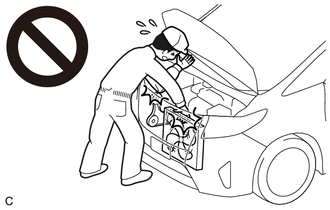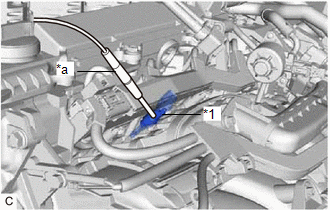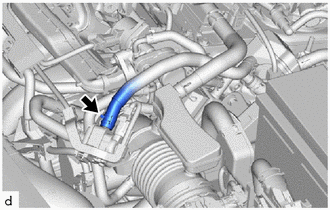Toyota Corolla Cross: On-vehicle Inspection
ON-VEHICLE INSPECTION
CAUTION / NOTICE / HINT
CAUTION:
- When working near the engine room while the engine has started or the power source mode is ignition switch to ON, do not touch the fan and generator V belt or rotating components such as the fan, etc.
- Touching the fan and generator V belt or rotating components such as the fan, etc. could result in your hand or clothing getting caught and pulled in.

PROCEDURE
1. INSPECT FUEL CUT OPERATION
CAUTION:
- When working near the engine room while the engine has started or the power source mode is ignition switch to ON, do not touch the fan and generator V belt or rotating components such as the fan, etc.
- Touching the fan and generator V belt or rotating components such as the fan, etc. could result in your hand or clothing getting caught and pulled in.
(a) Start the engine.
(b) Warm up the engine.
(c) Increase the engine speed to at least 3500 rpm.
| (d) Using a sound scope, check for injector operating sounds. |
|
(e) When the accelerator pedal is released, check that injector operating sounds stop momentarily and then resume.
If the result is not as specified, check the injectors, wiring and ECM.
Standard:
|
Item | Specified Condition |
|---|---|
|
Fuel cut off engine speed |
2500 rpm or higher |
|
Fuel injection restart engine speed |
1400 rpm |
2. VISUALLY INSPECT HOSES, CONNECTIONS AND GASKETS
(a) Visually check that the hoses, connections and gaskets have no cracks, leaks or damage.
NOTICE:
- Detachment or other problems with the engine oil dipstick, filler cap, ventilation hose or other components may cause the engine to run improperly.
- Air suction caused by disconnections, looseness or cracks in any part of the air induction system between the throttle body assembly and cylinder head sub-assembly will cause engine failure or engine malfunctions.
If any defects are found, replace parts as necessary.
3. INSPECT EVAPORATIVE EMISSION CONTROL SYSTEM
CAUTION:
- When working near the engine room while the engine has started or the power source mode is ignition switch to ON, do not touch the fan and generator V belt or rotating components such as the fan, etc.
- Touching the fan and generator V belt or rotating components such as the fan, etc. could result in your hand or clothing getting caught and pulled in.
(a) Connect the GTS to the DLC3.
(b) Start the engine.
(c) Warm up the engine.
(d) Turn the GTS on.
| (e) Slide the clip and disconnect the fuel vapor feed hose from the purge valve (purge VSV). |
|
(f) Enter the following menus: Powertrain / Engine / Active Test / Activate the EVAP Purge VSV.
Powertrain > Engine > Active Test|
Tester Display |
|---|
| Activate the EVAP Purge VSV |
(g) Check that vacuum occurs at the purge valve (purge VSV) port.
(h) If vacuum does not occur, check the following items:
- Purge valve (purge VSV)
- Clogs in the fuel vapor feed hose that connects the intake manifold and purge valve (purge VSV)
- Voltage from the ECM PRG terminal
Click here
.gif)
(i) Exit Active Test mode and connect the fuel vapor feed hose to the purge valve (purge VSV) and slide the clip to secure it.
(j) Enter the following menus: Powertrain / Engine / Data List / EVAP (Purge) VSV.
Powertrain > Engine > Data List|
Tester Display |
|---|
| EVAP (Purge) VSV |
(k) Warm up the engine and drive the vehicle.
(l) Confirm that the purge valve (purge VSV) opens.
If the result is not as specified, replace the purge valve (purge VSV), wire harness or ECM.




